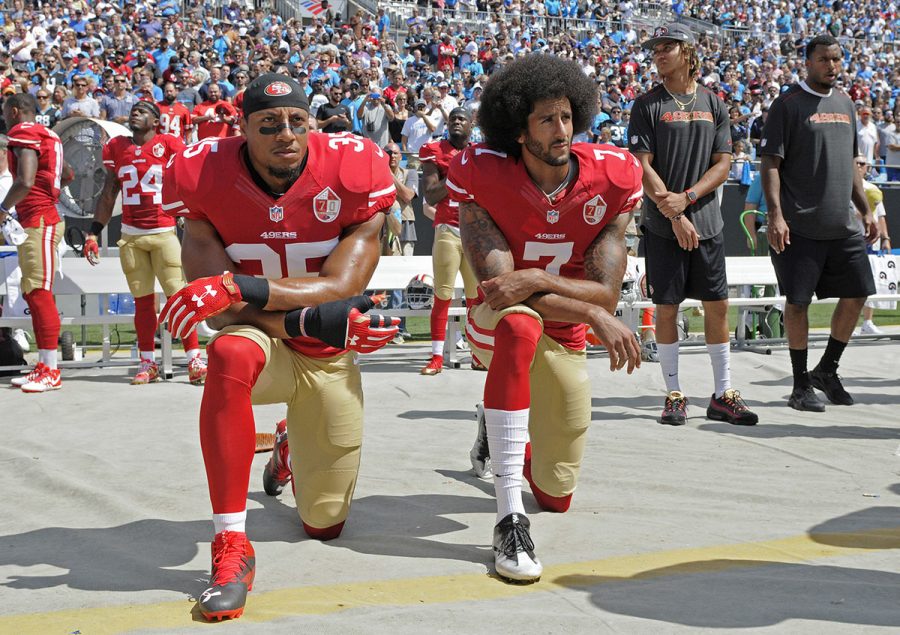Kaepernick’s exclusion from pro football signals a deeper problem
The quarterback was bypassed because he said he wouldn’t stop kneeling during the pre-game national anthem
Photo by SUBMITTED
Colin Kaepernick (right) kneels during the national anthem next to former teammate Eric Reid. Previously members of the San Francisco 49ers, both men are currently free agents.
Colin Kaepernick is, arguably, one of the best quarterbacks on the open market. He has also evolved into a prominent social activist. Despite Kaepernick’s widespread leadership, he is being excluded from pro football.
On Thursday, the Seattle Seahawks bypassed Kaepernick, signing Stephen Morris as a backup quarterback instead. Perhaps the decision didn’t come as a surprise: The Seahawks canceled Kaepernick’s practice with the team two weeks ago.
The Seahawks’ reason for disregarding Kaepernick is unclear, but ESPN speculates it was
because the quarterback said he wouldn’t stop kneeling during the pregame national anthem.
To me, quite frankly, the NFL’s actions are glaring evidence that racism is still prevalent in our society.
Kaepernick began taking a knee during the national anthem in 2016, according to The New York Times. The Milwaukee native knelt with the goal to expose the racial inequality and police brutality that plagues America. Kaepernick has also donated over $1 million to various charities to improve the lives of those less privileged.
Kaepernick’s use of primetime television not only made America notice — it sparked conversation. Of course, as is the political trend, America’s response was divided.
Some stood (took a knee) with Kaepernick. On Sept. 24, 2017, an estimated 204 players knelt during the national anthem. Others raised their fists or engaged in other forms of team unity.
Fellow former-49er Eric Reid also knelt with Kaepernick. Reid, like Kaepernick, became a free agent in 2016. Reid also remains unsigned — the Cincinnati Bengals said they passed on the athlete on business grounds, not personal.
Outside the sport, other prominent athletic figures supported Kaepernick’s movement. Basketball star LeBron James said he supports Kaepernick’s actions.
“For him to sacrifice the sport that he plays and to sacrifice the things he’s done his whole life because he knew what he believed in, I salute him. I salute and respect that,” James said at Cass Technical High School in Detroit, according to ESPN.
As the movement’s popularity grew, fans skipped watching the NFL in support of Kaepernick’s protest. Several veterans also tweeted their backing, stating they’ve fought for the Constitution, and therefore the right to protest.
However, the NFL and the President Donald Trump did not stand with Kaepernick. Trump released a statement calling for the firing of players who kneel during the anthem. Coincidentally, seven of 32 NFL franchise owners contributed $1 million or more to Trump’s inaugural committee, according to Sports Illustrated. Not a single franchise owner is African American.
It’s not a question whether Kaepernick is being avoided by NFL teams — the quarterback has not worked out with an NFL team since becoming a free agent in 2016. Add Reid’s availability too, and you’ve got what looks like punishment for protesting.
If the NFL’s scorn is not a punishment and is all just part of their business — after all, they want to keep and attract their viewers, the American public, then their disapproval is a reflection of our country.
As systematic racism is exposed through acts of protest like Kaepernick’s, some Americans are in an uncomfortable state of disbelief. They don’t want to acknowledge the depth of our nation’s problems, and thereby want to avoid it, perpetuating the problem.
Instead of putting on pads and a helmet, Kaepernick filed a collusion lawsuit against the NFL owners in October 2017. He is making a statement with the case, even if he does not win.
For now, it seems Kaepernick and Reid are being made an example: a warning sign from the NFL to players who think about exercising their freedom of speech and using their spotlight for good.
Though I hope players continue to stand by what they believe in, the choice between a hard-earned football career and a an act of protest is a difficult one to make.

Neupert is a fourth-year journalism student at UW-Eau Claire. She is the executive producer of Engage Eau Claire on Blugold Radio Sunday. In her spare time, Neupert's working on becoming a crossword puzzle expert.


